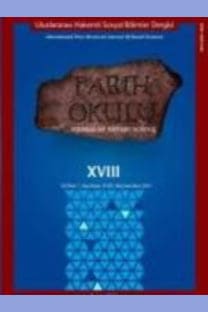BİR KAVRAM VE KURAM ÜRETME STRATEJİSİ OLARAK TEMELLENDİRİLMİŞ KURAM
Temellendirilmiş kuram, saha araştırmaları, nitel araştırma
Grounded Theory A A Strategy Of Producing Concept And Theory
Grounded theory, field studies, qualitative research,
___
- Breckenridge, J. (2002). Demystifying Theorical Samplig in Grounded Theory Research, The Grounded Theory Review, vol. 8, no.2, Mill Valley: Sociology Press, s.113-126. Charmaz, K. (2006). Constructing Grounded Theory: A Practical Guide Through Qualitative Analysis. London: Sage Publications. Glaser, B. and Strauss, A. (1967). The Discovery of Grounded Theory: Strategies for Qualitative Research. Newyork: Adline Pub. Co. Jones, M. and Alony, I. (2011). Guiding the Use of Grounded Theory in Doctoral Studies: An Example from the Australian Film Industry”, İnternational Journal of Doctoral Studies, Volume 6, Wollongong: Universtiy of Wollongong.
- Neumann, W. (2008). Toplumsal Araştırma Yöntemleri: Nitel ve Nicel Yaklaşımlar (S. Özge, Çev.) (I. Cilt). İstanbul: Yayın Odası. Punch, Keith F. (2005) (2005), Sosyal Araştırmalara Giriş: Nicel ve Nitel Yaklaşımlar (D. Bayrak; H. B. Arslan; Z. Akyüz, Çev.) Ankara: Siyasal Kitabevi. Strauss, A. and Corbin, J. (1990a). Basics of Qualitative Research: Grounded Theory Procedures and Techniques. London: Sage Publications. Strauss, A. and Corbin, J. (1990b). Grounded Theory Research: Procedures, Canons and Evaluative Criteria, Qualitative Sociology, Vol 13, No 1, Human Sciences Press, s. 3-21.
- ISSN: 1308-5298
- Yayın Aralığı: 6
- Başlangıç: 2008
- Yayıncı: Ahmet KARA
ALP TİPİ KAVRAMI ÇERÇEVESİNDE MANAS
ÜNİVERSİTE ÖĞRENCİLERİNİN SOSYAL AĞLARI KULLANIMLARINA YÖNELİK BİR ARAŞTIRMA
TÜRK YAZI DİLİNİN TARİHÎ DÖNEMLERİ VE ORTA TÜRKÇENİN YERİ MESELESİ
TÜRKÇE EĞİTİMİNDE ÖĞRETMENLİK UYGULAMASI DERSİ: BİR DURUM ÇALIŞMASI
İMLÂ VE TELAFFUZ SORUNUNDA TELEFON İLE İNTERNETİN ROLÜ
FIKRA TÜRÜNÜN EĞİTİMDEKİ YERİ VE TÜRKÇE DERS KİTAPLARINDAKİ KULLANILABİLİRLİĞİ
Neslihan KARAKUŞ, - Yasemin BAKİ
BİR KAVRAM VE KURAM ÜRETME STRATEJİSİ OLARAK TEMELLENDİRİLMİŞ KURAM
YÖNETİCİLERİN MİZAH TARZLARININ UYGULAMADAKİ DURUMUNUN KURAMSAL VE UYGULAMALI OLARAK AÇIKLANMASI
MOĞOL DÖNEMİNİN YÖNETİCİLERİNDEN MELİK MECNEDDÎN-İ KALYONÎ VE OĞLU ŞEMSEDDÎN MUHAMMED-İ KALYONÎ
